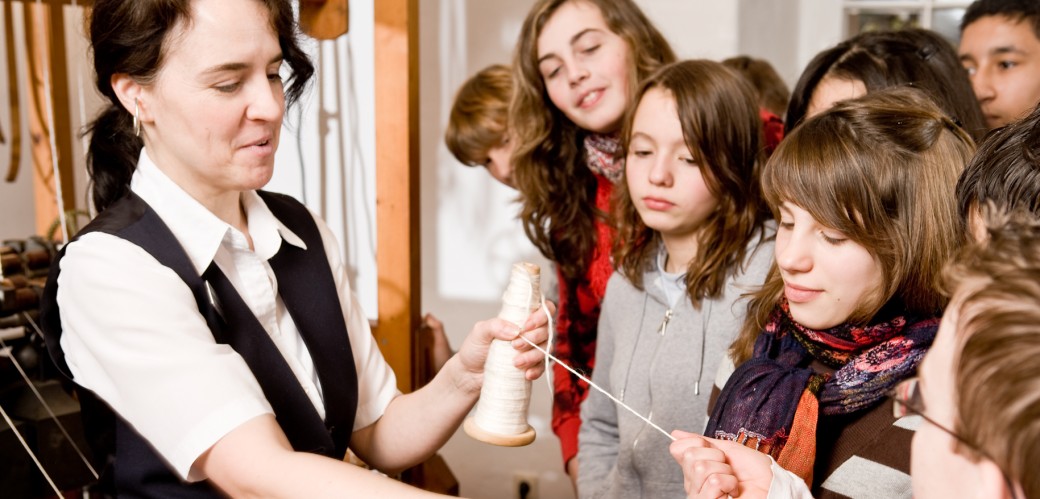

The seven sites of the LVR-Industriemuseum in Oberhausen, Solingen, Ratingen, Bergisch Gladbach, Euskirchen and Engelskirchen present the history of important industries in the Rhineland through their permanent exhibitions at authentic, listed factory sites: extractive metallurgy and metal processing, paper production, textile production, electricity and power generation. At its various sites, the LVR-Industriemuseum covers all phases of industrial history: starting with early industrialisation in the 18th century through the period of intensive industrialisation and the developments in the 19th and 20th centuries right up to the de-industrialisation and structural change of the past decades. The historic factories are visible evidence of industrial history and at the same time the largest exhibits of the LVR-Industriemuseum.
Temporary exhibitions covering a wide range of topics relating to industrial, social, cultural, regional, economic, technical and environmental history complement the permanent exhibitions. The temporary exhibitions are not confined to presenting historical facts but tie in with current socially relevant issues and can be quasi read as a commentary on them. In addition the temporary exhibitions consistently give visitors new insights into the museum collection and present different aspects thereof, placing the collection in its historic context and also providing it with current references.
The historically developed outdoor facilities at the various sites are evidence of their high leisure value.
The permanent exhibitions including demonstrations and interactive stations, the temporary exhibitions and the very diverse museum education options such as guided tours on specific topics, workshops, projects etc. are aimed at all social groups and age groups irrespective of educational and social status or origin. The museum regards itself – in line with the functions of its supporting institution Landschaftsverband Rheinland (LVR) – as part of the inclusive social environment and as a place for communication. For the LVR-Industriemuseum it is important to facilitate social and cultural participation for everyone through its programme options and its museum education programme. The notion of inclusion is extremely important at the LVR-Industriemuseum.
Since the museum was established in 1984 participation has been a constant element of the interaction with visitors and interested persons. From the very beginning people from the region have made a major contribution to building up the Rheinisches Landesmuseum für Industrie- und Sozialgeschichte providing information, stories, evidence and anecdotes, through donations, suggestions and discussions. The museum is continuing this tradition of participation above all in the museum education work.
Communication plays a central role at the LVR- Industriemuseum in line with the museum’s education function and self-concept as an enduring place of life-long learning and in particular as place for out-of-school learning. In the formulation of its principal guidelines, the LVR-Industriemuseum follows the “Quality criteria relating to education and communication in the museum” which were published by the Bundesverband Museumspädagogik (Federal Association for Museum Education) and the Deutscher Museumsbund (German Museum Association) in 2008. The Museum Education Service aligns itself with the core statement of the education concept formulated by Wolfgang Klafki:
“A good educational background means to gain a historically communicated awareness of central problems of the present and – as far as can be identified – of the future.”
Aim of the LVR-Industriemuseum Education Service is to contribute to an understanding of the present and of current social issues and problems by communicating historical knowledge in order to develop decision-making skills for the future and to strengthen social competence.
History is, however, not the only topic. The wide-ranging spectrum of topics at the sites also provides links to countless other topics, for example in MINT subjects (Mathematics, Computer Sciences (IT), Natural Sciences, Technology) art or language.
The museum education options confine themselves not only to options for school classes or groups of children and adolescents but target everyone. They are based on the multi-dimensional education concept which links formal, non-formal and informal education whereby education and entertainment are not mutually exclusive. The museum educationalists therefore organise informative options, inspiring and activity-orientated choices as well as options to reflect on the institution and the subject matter presented there.
Expertise as well as many years of experience and practice in developing concepts and also creative implementation is the prerequisite for a quality-assured Museum Education Service. Contents, methods and aims of the communication activities are matched to the focus and specific topics of the individual sites. The Museum Education Service is part of the continuously developing museum and it participates in all the formative processes.
1. Developing educational options for the permanent and temporary exhibitions as well as special programmes which make the museum a place for cognitive, activity –oriented learning, sensually aesthetic experiences as well as communication. At the same time complex contextual and thematic connections are explained appropriately for the target group in order to give as many visitors as possible irrespective of age or origin the opportunity to participate in the diverse options.
The museum education options are based on the following basic principles:
2. Co-operation with all types of schools and levels such as teacher training colleges taking into account the current school-related developments (didactics, education theory and the methodology applied in various subjects)
3. Qualification and professional approach of staff in the Museum Education Service and in the adjoining work areas
4. Development of options from the aspect of visitor orientation, i.e. consideration of the wishes and needs of visitors in order to enable all those interested to participate in cultural education.
5. Development of exhibition concepts paying particular attention to the communication and museum education aspects
6. Setting up and maintaining networks with different co-operation partners from the education and leisure sectors, e.g. school partnerships, and development of joint co-operation projects.